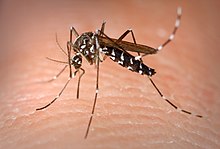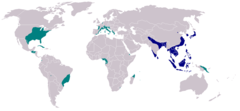Asian tiger mosquito
| Asian tiger mosquito | |
|---|---|

| |
| Female at the start of feeding | |
| Scientific classification | |
| Kingdom: | |
| Phylum: | |
| Class: | |
| Order: | |
| Family: | |
| Subfamily: | |
| Genus: | |
| Subgenus: | |
| Species: | A. albopictus
|
| Binomial name | |
| Aedes albopictus (Skuse, 1894)
| |

| |
| Dark blue: Native range Dark green: introduced (as of December 2007) | |
| Synonyms | |
|
Culex albopictus Skuse, 1894 | |
The Asian Tiger Mosquito, or forest day mosquito is a kind of mosquito that is native to tropical and subtropical South-East Asia. It has black and white striped legs, and small black and white striped body. The Asian Tiger Mosquito is about 2 to 10 mm long.[1] The males are about 20% smaller than the females.
In the last few decades, the species has spread to many other countries, mainly through the transport of goods.[2] Many communities see this species as a pest. Unlike other mosquitos, the Asian Tiger Mosquito associates with humans. Other mosquitos tend to live in wetlands. The Asian Tiger Mosquito is also active during the day, while most other mosquitos are only active during dusk and dawn.
The Asian Tiger Mosquito can spread several diseases, such as West Nile virus, Yellow fever virus, St. Louis encephalitis,[3] dengue fever, and Chikungunya fever,[4]
References
[change | change source]- ↑ Y.-M. Huang (1968) Neotype designation for 'Aedes (Stegomyia) albopictus' (Skuse) (Diptera: Culicidae). Proceedings of the Entomological Society of Washington 7(4): 297–302
- ↑ J.-E. Scholte & F. Schaffner (2007): Waiting for the tiger: establishment and spread of the Aedes albopictus mosquito in Europe. In: Emerging pests and vector-borne diseases in Europe. Volume 1, herausgegeben von W. Takken & B. G. J. Knols. Wageningen Academic Publishers. ISBN 978-90-8686-053-1
- ↑ Randolf, V.B.; Hardy (1998). "Establishment and characterization of St Louis encephalitis virus persistent infections in Aedes and Culex mosquito cell lines". Journal of Genetic Virology. 69 (9): 2189–2198. doi:10.1099/0022-1317-69-9-2189. PMID 2842432.
- ↑ Hochedez, P.; et al. (2006). "Chikungunya Infection in Travelers". Emerging Infectious Diseases. 12 (10): 1565–1567. doi:10.3201/eid1210.060495. ISSN 1080-6040. PMC 3290953. PMID 17176573.
